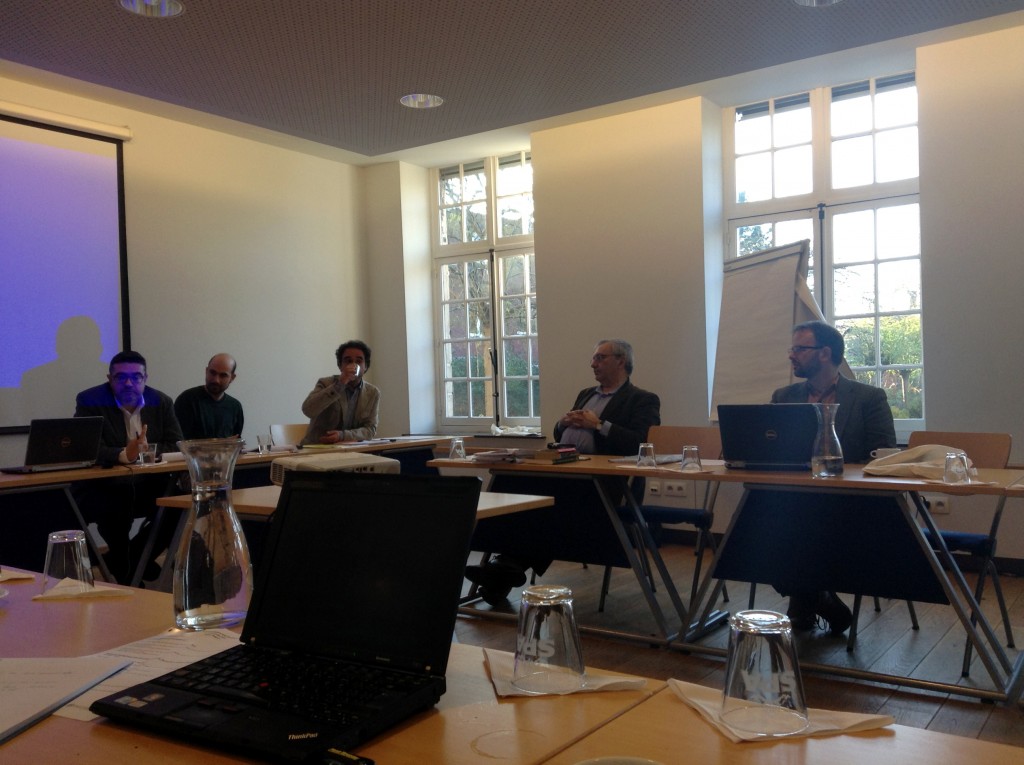Entangled Transitions
ENTANGLED TRANSITIONS: BETWEEN EASTERN AND SOUTHERN EUROPE 1960s-2014
December 8 – 10, 2014
The Leuven Institute for Ireland in Europe
Our first conference was organised in partnership with the research unit MoSa (Modernity & Society 1800-2000) at KU Leuven, in co-operation with Complutense University of Madrid. It took place at The Leuven Institute for Ireland in Europe and ran over 3 days.
The conference programme is available below and can also be downloaded as a pdf: Entangled Transitions Conference Programme Final.
Details of publication will be available shortly.
CONFERENCE SYNOPSIS
In under two decades, authoritarian political systems collapsed across Europe – in the south of the continent in the 1970s, and then in the east between 1989 and 1991. Although much work has been done on these processes in each region, and comparative work carried out on post-authoritarian transitions and memories, there has yet to be any sustained scholarship that examines the ‘entangledness’ of these processes in the context of broader European and global processes of the late Cold War and its aftermath. Taking a longue durée approach, this conference will explore these inter-relationships between the 1960s and the present day. 2014 marks the 25th anniversary of the fall of state socialism and the 40th anniversary of the beginning of the transition from dictatorship on the Iberian Peninsula and in Greece: an ideal time to consider the relationship between these processes that have been central to modern European history.
Transnational histories of post-war Europe have hitherto been focused on connections between western and eastern Europe, or western and southern Europe, but have paid little attention to east-south exchanges. This event will address the networks through which these linkages emerged (governments, international organisations, expert groups such as economists, exiles, diplomats, cultural groups, dissidents, churches, NGOs and so on), and explore those ideas (e.g. modernisation on the periphery, development, authoritarianism, dissidence, human rights, subnational nationalisms, and the relationship to Europe) which gave meaning to those linkages, whether in imagined or real terms.
By analysing these connections, this conference aims to develop new perspectives on broader developments in international history, such as détente, the end of the Cold War, processes of globalisation, regional integration, and democratisation.
CONFERENCE PROGRAMME
Monday 8 December 2014
Conceptualizing South-East Connections, Encounters and Transfers
(James Mark, José Faraldo, Kim Christiaens)
Session I. Discovery & Entanglement
Chair: Idesbald Goddeeris (Leuven University)
From Enemies to Allies? The Carnation Revolution and Czechoslovakia
(Pavel Szobi, Cologne University)
A Spanish Future? : From Anti-Fascist Inspiration to Future Model – Imagining the Future of Socialism and Transition in Hungary 1970s-1990s
(James Mark, University of Exeter)
The Mediterranean and the Eastern Bloc During Détente
(Antonio Varsori, Padua University)
Keynote
Remembering Dictatorship: Eastern and Southern Europe Compared
(Stefan Troebst, Leipzig University)
Tuesday 9 December 2014
Session II. Discovery & Entanglement II
Chair: Víctor Fernández Soriano (Université Libre de Bruxelles)
Illusion of Common Goals?! The Debate About the Support From Communist Countries Among the Left Opponents of the Greek Dictatorship
(Janis Nalbadidacis, Humboldt University Berlin)
Leftist Fascists, Rightist Communists: The Case of Spanish Fascists Confronted with Third World Communism and Reformists in Eastern Europe
(Miguel Ángel Ruiz Carnicer, Zaragoza University)
Session III : Making Sense of the End of State Socialism: The Southern European Perspective
Chair: José Faraldo (Complutense)
East European Exiles Through a Greek Lens: The “Polish Crisis” and its Aftermath in the Films of Christoforos Christofis and Costa-Gavras
(Kris Van Heuckelom, Leuven University)
The Breakup of Yugoslavia in Catalan and Spanish Discourses of Collective Identity
(Teresa Pinheiro, Chemnitz University)
From Emergency to Democratization: the Italian Solidarity Movement and the Yugoslavian Crisis
(Marzia Bona, Bologna University)
Session IV: Crossing Borders, Defining Identities and Practices
Chair: Kim Christiaens (Leuven University)
1970s Generations of the Left and the Shifting Narratives about Transition in Greece and Eastern Europe
(Nikolaos Papadogiannis, Humboldt University Berlin)
Living (near) the Border. Politics, Discourses, Everyday Life and Memory about the Southern Bulgarian Border
(Ana Luleva, Bulgarian Academy of Sciences)
Shifting Peripheries: Coastal Over-Development from Spain to Bulgaria
(Max Holleran, New York University)
Session V: Transitional Justice and Dealing with the Legacy of Dictatorship
Chair: Sam De Schutter (Leuven University)
Francoist Spain in the Middle of the 1970s and Communist Poland in the Late 1980s: A Transnational Perspective
(Dominik Trutkowski, Humboldt University Berlin)
Entangled Semantics and Argumentations of Polish Ways of Dealing with the Communist Past After 1989
(Paulina Gulińska-Jurgiel, Halle University)
Confronting the Past in ‘Transitions Through Collapse’. Comparing Southern and Central European Experiences
(António Costa Pinto and Filipa Raimundo, University of Lisbon/ Institute of Social Sciences)
Wednesday 10 December 2014
Session VI: Entangled Afterlives of Transition
Chair: Berber Bevernage (Ghent University)
Southern European and Eastern European Transitions in Public Debates in Western Europe During the 1990s
(Guido Franzinetti, University of Eastern Piedmont)
Modernization as a Catch-all Ideology in Hungary and Spain
(Nicolás Sesma, University of Zaragoza)
Bringing up Political Conditionality. The European Community in front of Southern and Eastern Transitions
(Víctor Fernández Soriano, Université Libre de Bruxelles)
Session VII: Final Round Table & General Discussion: Conceptualizing Entangled Transitions
Chair: Idesbald Goddeeris (Leuven University)
Short Comments (António Costa-Pinto, Kim Christiaens, José Faraldo), followed by discussion
[Top]






